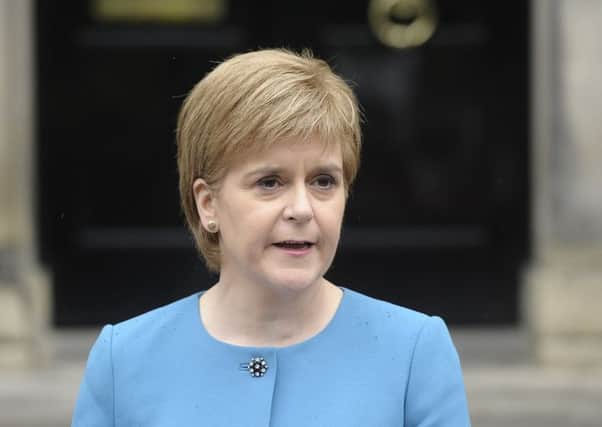Leaders: Time to wake up to Scotland's bottom line


The headline figures revealing the state of the Scottish economy are bad, there is no doubt about it.
Catching sight of the stark £14.8 billion deficit figure against the backdrop of a North Sea oil platform on our television screens was a sobering moment,
Advertisement
Hide AdAdvertisement
Hide AdAnd as ever, there will be an argument that the situation is not as bad as it looks, or that the bottom line only looks bleak because of specific circumstances such as the fall in the price of a barrel of oil.
Another line is that governments do not run their economies like individual householders, trying to balance household bills against salary, that governments have access to substantial lending and reserves, as yet to be brought into play.
Indeed Scotland’s finance secretary Derek Mackay said Government Expenditure and Revenue Scotland (GERS) represents Scotland’s fiscal position under the current constitutional arrangements and the position under an independent Scotland would look different.
But the GERS figures are official Scottish Government statistics, and at some stage we have to stop the speculation and take such figure at face value. There cannot be any “could be” or “should be” about them… they are figures which record a moment in time.
It is too easy to dismiss the numbers as skewed because of what has happened in the oil and gas industry.
However, it is precisely that effect we should be worried about, because it shows how a supposed strength of the Scottish economy – often hailed as a unique guarantor of Scotland’s future wellbeing – can have such a huge effect on the overall picture if anything goes wrong.
First Minister Nicola Sturgeon has this week hinted that legislation paving the way for a second referendum is imminent.
But she must know this kind of economic record is going to undermine any gains that may be made from those angry at Brexit who say they are more inclined to support Scottish independence now than in 2014.
Advertisement
Hide AdAdvertisement
Hide AdBack then, the economic case for independence was not convincing. And two years on, little has happened to suggest this matter has been addressed.
If the SNP wants to start a new push for independence, they will not get far on emotion and sentiment. Before a second referendum could even be considered, they have to come up with more convincing arguments in areas where they failed last time, or they risk wasting everyone’s time.
Economic performance is of course one of those areas. And so is EU membership. Perhaps most tellingly, new EU members are expected to have a budget deficit of no more than 3 per cent. Current figures would suggest Scotland’s budget deficit would be three times that level. So offering indyref2 as a way out of Brexit looks flawed on more than one front.
Until the Scottish Government can demonstrate that the economy is moving in the right direction, talk of indyref2 rings hollow.
Power without responsibility
The fight against terrorism is the most difficult that security forces have ever encountered. They are struggling to identify an enemy – perhaps based in the next street or moving around, blended into the mainstream, but operating silently and with stealth, attacking when and where they choose to cause panic and destabilise.
Meanwhile cybercrime – which does not necessarily mean terrorism – is soaking up more resources than can be allocated to it.
Our security services need all the help they can get to combat terrorism. Appealing to the public to raise the alarm over suspicious activity, as useful as this may be, is never going to make the required difference.
Terrorists have to communicate to recruit and promote their cause and the global social media giants’ services are the means which are being used for this purpose. The obligation therefore falls on these companies to honour their social and moral responsibilities to do far more.
Advertisement
Hide AdAdvertisement
Hide AdYes, Twitter, for example, has taken down more than 200,000 accounts for violating policies relating to promoting terrorism since February. But these companies have also been prone to hiding behind their own version of protecting human rights and privacy.
Social media came of age a long time ago and its owners are obligated to deal with the resulting problems. Some measures are in place – but the Commons home affairs select committee report says more could be done.
Social media ventures have produced rich rewards for companies. With that reward comes the responsibility to help properly police a vehicle which has played into the hands of terrorists.